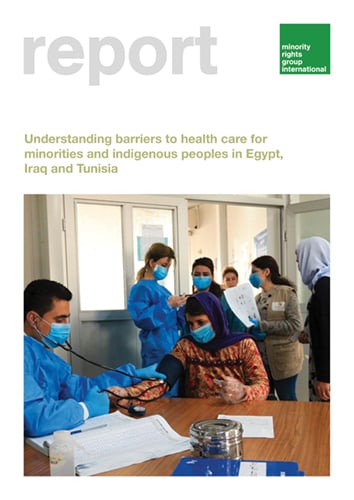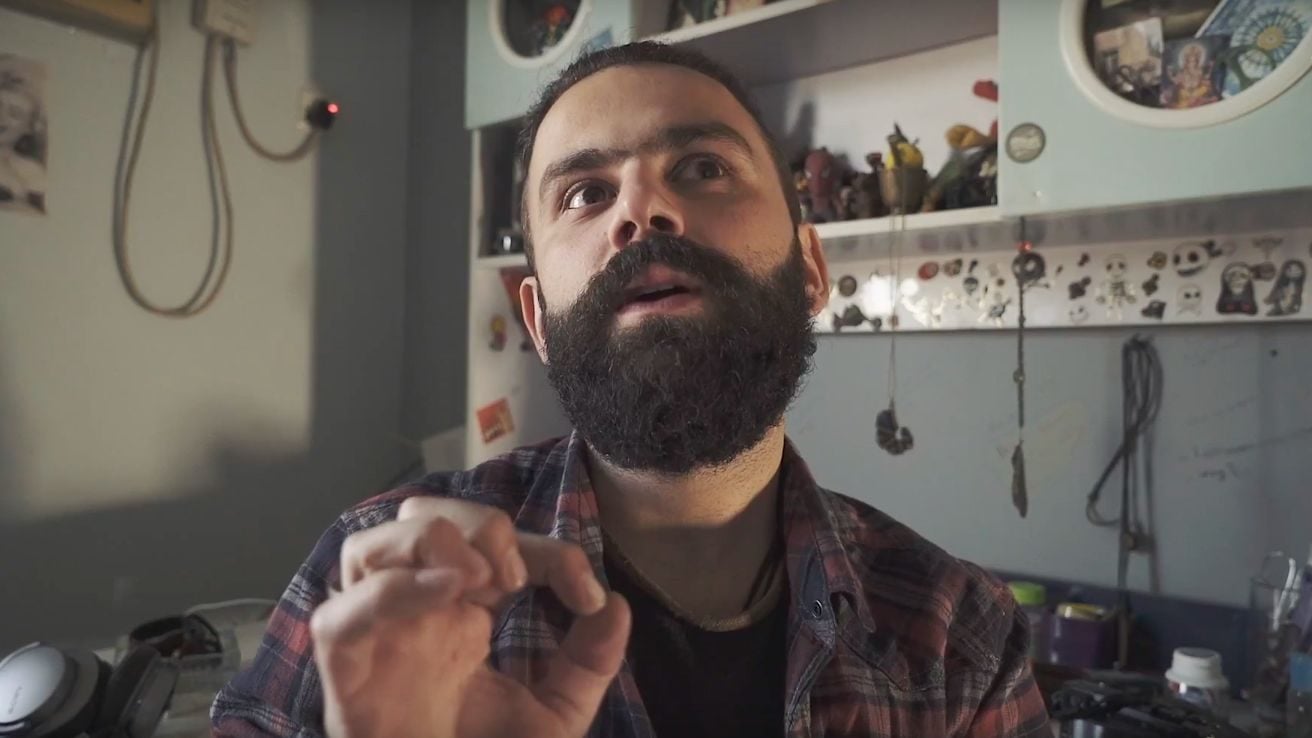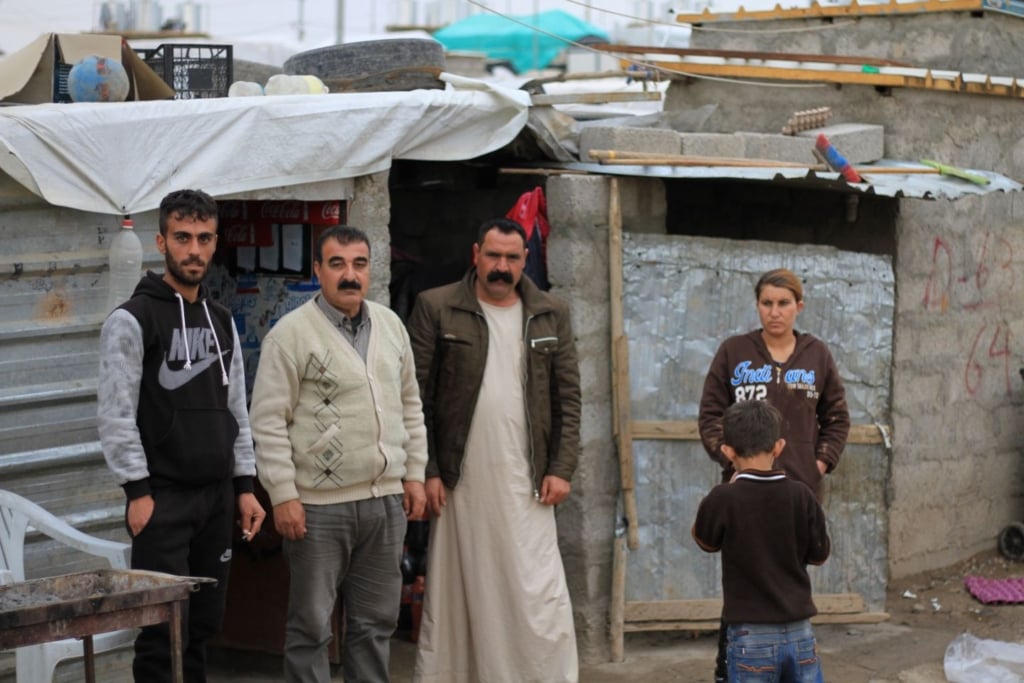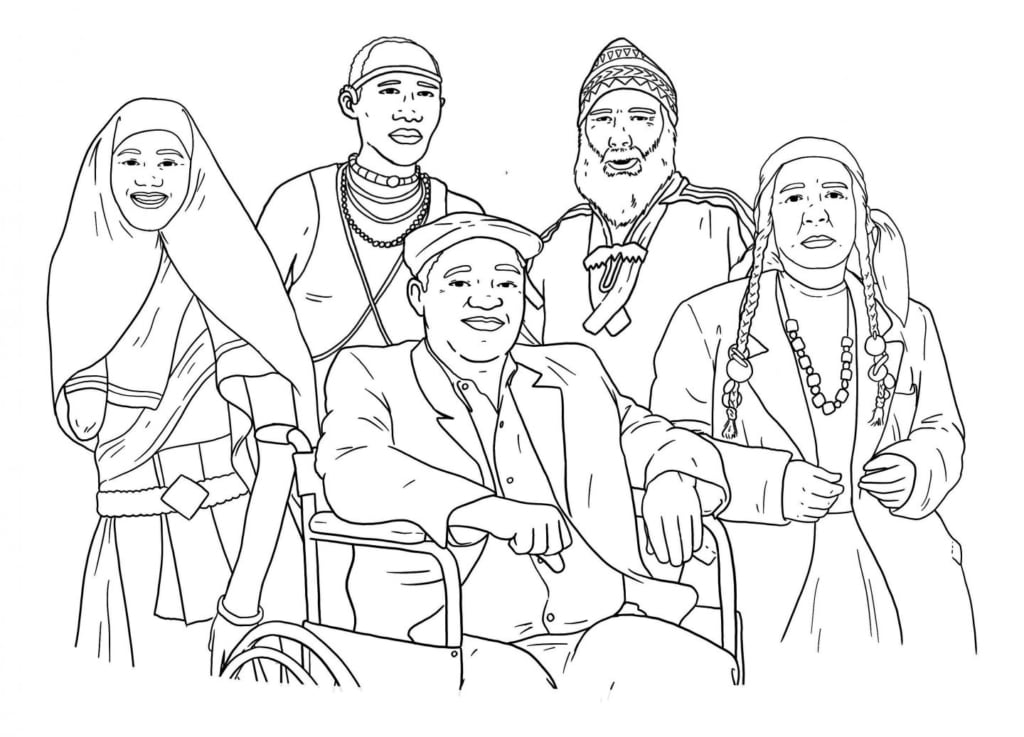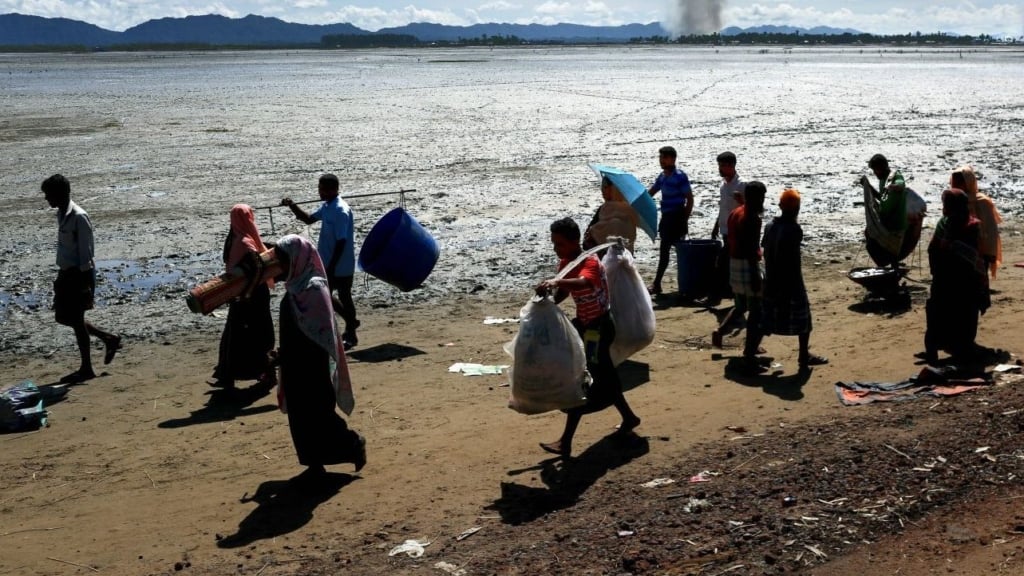Iraq
-
- Armenians in Iraq
- Assyrians in Iraq
- Bahá’í in Iraq
- Black Iraqis in Iraq
- Chaldeans in Iraq
- Faili kurds in Iraq
- Kaka’i in Iraq
- Kurds in Iraq
- Minority persons with disabilities in Iraq
- Roma in Iraq
- Sabian Mandaeans in Iraq
- Shabak in Iraq
- Turkmen in Iraq
- Twelver (Ithna’ashari) Shi’as in Iraq
- Yezidis in Iraq
-
The population of Iraq is approximately 37,548,000 (UN, 2016). The three largest demographic groups are Shi’a Arabs, Sunni Arabs and Kurds, most of whom adhere to Sunni Islam. Precise demographic breakdowns are impossible to come by, in the absence of recent census data and due to political sensitivities surrounding the issue. According to reliable estimates, 99 per cent of Iraqis are Muslim, of which 60-65 per cent are Shi’a and 32-37 per cent are Sunni. The remaining population is composed of various religious minorities. Prior to the ISIS advance, there were an estimated 350,000 Christians in Iraq, 500,000 Yezidis, 200,000 Kaka’i, less than 5,000 Sabean-Mandaeans and a small number of Bahá’í.
In terms of ethnicity, Arabs make up between 75 – 80 per cent of the population and Kurds a further 15-20 per cent. Ethnic minorities include Turkmen, Shabak, Chaldeans, Assyrians, Armenians, black Iraqis and Roma. Some Yezidis consider themselves a distinct ethnic group, while others identify as being Kurds.
-
Environment
Iraq is located in the Middle East and is bordered by Iran to the east, Saudi Arabia and Kuwait to the south, Jordan and Syria to the west, and Türkiye to the north. The country has a small coastline along the Persian Gulf, extending approximately 58 kilometers. Iraq’s main geographical features include large expanses of desert in the west and southwest, fertile alluvial plains along the Tigris and Euphrates rivers, and mountainous regions in the north. With the second largest oil reserves in the world, Iraq’s economy is dominated by the petroleum sector. The capital, Baghdad, is located in the center of the country.
History
The area of land extending between the Tigris and Euphrates rivers was historically known as Mesopotamia, often referred to as the cradle of civilization for the important developments it spurred in agriculture, writing, mathematics, architecture, law and other fields. The region fell under the control of successive empires and civilizations over the course of history, including the Assyrian, Babylonian, Greek, Persian, Arab and Ottoman empires. With the collapse of the Ottoman Empire in the wake of World War I, the League of Nations carved out Iraq’s modern day borders and designated the country a mandate under British control. The British installed Faisal I of the Hashemite dynasty in power, and Iraq became a monarchy, then gaining independence from Britain in 1932. The monarchy lasted until 14 July 1958, when it was overthrown by a group of nationalist and anti-imperialist army officers who declared Iraq a republic.
Between 1968 and 2003, Iraq was governed by the secular Arab Socialist Ba’ath Party, initially under the presidency of Ahmed Hassan Al-Bakr, followed by Saddam Hussein from 1979 onwards. Iraq was characterized by one-party rule under this time period, with high-ranking positions in the public sector reserved for Ba’ath Party members. The Revolutionary Command Council constituted the top decision-making body in the country. In terms of economic policy, the Ba’ath Party nationalized the oil industry, using the profits to build a state welfare system, and undertook a program of agrarian reform under which large plots of land were divided and redistributed to the peasants. However, the Ba’ath Party stopped short of advocating full socialism, allowing a small private sector and a third mixed sector to operate alongside the public sector.
Saddam Hussein faced strong opposition and even armed rebellion against his rule at many points, especially from the Kurds in the north and Shi’a in the south. Hussein maintained his grip on power through a massive and intricate internal security apparatus, through which he was able to silence his critics, often through brutal means. Hussein also undertook large-scale ‘Arabization’ campaigns in Northern Iraq that saw ethnic minorities, including Kurds, Yezidis, Assyrians, Shabaks and others, forcibly displaced and their villages destroyed or transformed into Arab villages. Between 1986 and 1989, in the midst of the Iran-Iraq War, Hussein carried out the genocidal Anfal campaign against Iraq’s Kurds, culminating in a chemical attack on the civilian population of Halabja in 1988.
Long-standing border disputes with Kuwait, fuelled by disagreements related to debt repayment and oil prices, led Iraq to invade and annex Kuwait in August 1990. The UN responded by imposing a financial and trade embargo on Iraq, and a US-led coalition intervened to repel Iraq from Kuwait, launching the short-lived Gulf War. US involvement also led to the creation of a no-fly zone in Northern Iraq, which provided the Kurds with a degree of safety from Saddam Hussein’s armies and allowed them to establish a semi-autonomous zone. Following Iraq’s withdrawal from Kuwait, sanctions on Iraq remained in place for more than a decade, leading to huge increases in malnutrition, disease and mortality rates among the civilian population.
In 2003, the United States and several of its allies invaded Iraq under the pretext that Saddam Hussein was producing weapons of mass destruction and providing support to Al-Qa’eda, accusations that were later proven to be baseless. US forces overthrew the Ba’ath Party, disbanded the Iraqi army, and established a military occupation led by the Coalition Provisional Authority (CPA). Saddam Hussein was captured in December 2003, and later put on trial, sentenced to death and executed. The CPA oversaw the transfer of power to the Interim Iraqi Authority in 2004 and then the Government of Iraq following the ratification of a new Constitution and the holding of elections in 2005.
The US-led overthrow of the Ba’ath Party regime created a security vacuum, prompting a proliferation of insurgent armed groups and the outbreak of sectarian violence. During the worst two years of bloodshed from 2006-2007, more than 55,000 civilians were killed, according to the NGO Iraq Body Count. The United States also committed war crimes and human rights violations in Iraq, including, most notoriously, systematic torture and abuse of detainees. The American military presence in Iraq formally ended in December 2011 when the last US troops withdrew from the country.
Following the US withdrawal, the situation in the country remained unstable. In 2012, Sunnis organized large-scale protests to what they saw as their marginalization under the government led by Nouri Al-Maliki, which were met with violent repression. It was in this context that the Islamic State of Iraq and al-Sham (ISIS), an offshoot of Al-Qaeda in Iraq, rose to prominence, emboldened by gains it had made in neighboring Syria. In January 2014, ISIS took control of the Sunni-majority cities of Ramadi and Fallujah in Anbar governorate. On 10 June 2014, Iraq’s second-largest city of Mosul fell to ISIS control as the Iraqi Security Forces collapsed. ISIS renamed itself as the ‘Islamic State’ and announced the establishment of a caliphate, with Al-Raqqa in Syria as its self-declared capital. Over July and August the group swept across northern Iraq, committing atrocities against ethnic and religious minorities and prompting international intervention in the conflict, primarily through airstrikes. By late 2014, ISIS was in control of roughly one third of Iraqi territory.
In response to the collapse of the Iraqi Security Forces in Mosul, which sent shockwaves across the country, the Grand Ayatollah Ali Al-Sistani released a fatwa calling on Iraqis to take up arms to defend their country from the threat of ISIS. Following the fatwa, thousands of primarily Shi’a Iraqi men signed up as volunteer fighters, leading to the formation of the Popular Mobilization Forces (PMF), which played a decisive role in the conflict. Following the advance of ISIS into Sinjar and the Ninewa plains, many minorities also formed their own militias, some of which were incorporated into the PMF. The Iraqi Security Forces, together with its allied militias, the Kurdish Peshmerga forces, and international support, launched a series of offensives over 2015 and 2016 and managed to retake much of the territory formerly controlled by ISIS. In October 2016, the Iraqi government announced the start of the military assault on Mosul, the last major city still under ISIS control.
Governance
Iraq is a federal parliamentary republic. The 2005 Constitution of Iraq provides a framework for democratic governance and guarantees a broad set of rights and freedoms in line with international human rights law, including recognition of minority rights for some communities. Executive power is shared by the Prime Minister, who heads the Council of Ministers, and the President, who acts as head of state. Iraq’s main legislative body is the 328-member Council of Representatives (CoR), the members of which are elected for four-year terms. The CoR includes a 25 per cent quota for women, and eight reserved seats of representatives of the Christian, Yezidi, Sabean-Mandaean and Shabak minorities. The judicial system combines elements of secular and Islamic law.
Appointments to ministries and other governing bodies are made according to the ‘muhasasa’ principle, an unofficial ethno-sectarian quota system which guarantees representation for Iraq’s three largest demographic groups: Sunnis, Shi’a, and Kurds. Although this system is not required by the Constitution or by law, it is a legacy of the American occupation that has been followed by successive governments ever since. The quota system has been criticized for fostering clientelism, encouraging appointment based on identity rather than merit, enshrining sectarian divisions and marginalizing minorities.
Since the fall of Saddam Hussein, Shi’a Arabs have been politically dominant in Iraq. An order passed by the Coalition Provisional Authority banned former members of the Ba’ath Party from serving in public positions, excluding thousands of Sunnis from participating in government or working in the civil service, education and healthcare sectors. Nouri Al-Maliki, who served as Prime Minister between 2006 and 2014, was widely seen as exacerbating the marginalization of Sunnis by centralizing power for his own party and harshly repressing opposition. Since his appointment in 2014, Prime Minister Haider al-Abadi has made greater efforts to include Sunnis and Kurds in governance.
The Kurdistan Region of Iraq is recognized as an autonomous region under the 2005 Constitution, and is governed by the Kurdistan Regional Government (KRG), based in Erbil. The KRG has its own Constitution and parliament, which is dominated by the two leading Kurdish parties, the Kurdistan Democratic Party (KDP) and the Patriotic Union of Kurdistan (PUK). In addition, 11 out of 111 seats are reserved for ethnic and religious minorities. The KRG receives a portion of Iraq’s revenues from oil exports, although it has also signed its own oil contracts in recent years, to the consternation of Baghdad.
Governance of the ‘disputed territories’, including Kirkuk, the Ninewa plains, Tal Afar and Sinjar, continues to be unsettled. The disputed territories are areas that were subject to Arabization policies under Saddam Hussein and over which both Baghdad and Erbil have claims. Article 140 of the 2005 Constitution stipulates that this status of these areas should be settled by referendum, which has up until now never been held. Since the advance of ISIS in 2014, many of these areas have come under the de-facto control of the KRG.
-
For a number of years, Iraqi government forces and associated armed groups, supported by an international coalition, have fought to take back control of territory captured by the Islamic State of Iraq and al-Sham (ISIS) since 2014. The fighting created additional waves of displacement as large numbers of people were forced to flee their homes as a result of military operations to retake the cities of Fallujah and Mosul. Fallujah was recaptured by Iraqi forces in June 2016, and Mosul was regained in July 2017. The capture of these two cities as well as other areas from ISIS meant that there was a marked shift during 2018 with large numbers of displaced returning home and some degree of normalcy being gained in certain parts of the country. However, at the same time ISIS continued to maintain pockets of resistance from which it attacked and killed Iraqi civilians as well as military during 2018.
While ISIS has been responsible for many of the worst atrocities in the country, other actors in the conflict have also carried out serious human rights abuses. During the Iraqi government’s military operations to retake the city of Fallujah in May and June 2016, which had been under ISIS control since January 2014, the retaking of the city – supported by police forces and militia units organized under the umbrella of the Popular Mobilization Forces (PMF) – was rife with human rights abuses, drawing condemnation domestically and internationally. While ISIS attacked civilians leaving the city, targeting them by sniper fire and burning boats to prevent civilians from crossing the Euphrates River, at PMF-run checkpoints Sunni Arab families fleeing the city were intercepted, and men were separated from their families, detained in inhumane conditions, insulted, beaten, tortured and even executed. Moreover, both sides of the conflict were criticized for obstructing the passage of humanitarian supplies into the city, and for conducting hostilities in densely populated areas without taking adequate precautions to prevent civilian casualties and damage to civilian objects.
In October 2016, the government announced the beginning of the assault on Mosul, the last major city under ISIS control with a pre-war population of around 2.5 million people. The start of the Mosul operation raised fears that many of the shortcomings of the Fallujah operation might be repeated. In the first month of the assault, reports emerged of detentions, beating, torture and revenge killings of men and boys captured outside of Mosul by government forces and Sunni tribal militias. According to the UN, ISIS also executed hundreds of Iraqis in Mosul and rounded up civilians for use as human shields. As of August 2017, over 830,000 people had been displaced as a result of the Mosul operations, with a sharp increase of nearly 400,000 in just a few days at the beginning of July.
The fighting has been accompanied by wide-ranging human rights violations and breaches of international humanitarian law, in which all sides to the conflict were complicit. Iraq’s minorities, which include Armenian and Chaldo-Assyrian Christians, Bahá’í, Kaka’i, Sabean-Mandeans, Shabak, Turkmen, Yezidis and others, have been particularly targeted since the onset of this most recent phase of the conflict in 2014.
At the height of the conflict, the UN Office for the Coordination of Humanitarian Affairs (OCHA) reported approximately 6 million displaced. By early 2019, about 4 million people had returned home. UN OCHA recorded approximately 1.8 million still displaced in 2019, with 6.7 million people still in need of humanitarian assistance. Those who remain displaced are often those without the means or capability to migrate or return. Internally displaced persons (IDPs) who have not yet returned home often cite the need for basic services in areas of origin, such as water, electricity and waste management, as well as the reconstruction of homes, as factors for their continued displacement.
While it has eased somewhat, the displacement crisis in Iraq is still significant and brings multiple protection challenges for Iraq’s most vulnerable, including women and minorities. Access to basic needs such as shelter, food, water, and medical care remains uneven for IDPs and varies greatly by location. In addition to these humanitarian challenges common to all IDPs, minorities are also contending with the psychological impact of witnessing the destruction of their places of worship and other built cultural heritage, and in some cases their complete ejection from their historical homelands. Since most of those killed in the fighting have been men, thousands of women and girls have been made widows and orphans and thrust into the role of breadwinner. Women and girls without a male protector are more vulnerable to harassment and are often pressured into marriages as a means of protection and financial support. Many of these marriages are concluded by a religious figure without being officially registered, which leaves women with no legal rights in cases of divorce or abandonment and means children born of the marriage will be undocumented.
There has also been comparatively little progress on critical issues such as reconciliation and reintegration of IDPs. The conflict since 2014 has produced deep divisions in Iraqi society, and was itself fuelled by years of marginalization, discrimination and sectarian governance. Iraq’s minorities in particular are intensely distrustful of both the Federal Government of Iraq and the Kurdish Regional Government (KRG). Not only did both governments provide meagre opportunities for minorities to participate meaningfully in governance in the years leading up to 2014, but they failed to protect them from the advance of ISIS in the summer of 2014.
Many displaced minorities face serious consequences resulting from the loss or theft of their identity documentation following their displacement. Bureaucratic obstacles prevent IDPs from registering for replacement or new identity documents, such as the requirement to do so from particular inaccessible locations. Without the necessary civil documents, IDPs may find it challenging to register subsequent divorces, deaths, marriages and births, with restrictions on the latter impeding displaced children’s attainment of nationality.
A gendered dynamic to registration procedures compromises the rights of children born from rape, or to an undocumented or deceased father. This particularly affects Yezidi women who have given birth to children as a result of rape by members of ISIS. Although Iraq has reportedly reformed its laws to allow women to confer nationality to their children at birth, the inability of Yezidi IDP women to do so without paternity documents is a major restriction that leaves their children at risk of statelessness.
While some educational facilities do exist for IDPs, many parents of children from minority groups do not have the resources to pay for transport to schools. Language barriers pose a further distinct challenge when it comes to educating ethnic or religious minority IDPs. Where the curriculum is Kurdish, non-Kurdish speakers are de facto prevented from accessing school or universities. Many Christian and Yezidi children have been quitting even temporary schools due to a different education environment, whereas IDPs from Sinjar have reported difficulties in adapting to the KRG curriculum, as schools in Sinjar pre-ISIS used to follow the Arabic curriculum of the Iraqi government. Ongoing uncertainty in relation to camp closures and continuous movements of people are also causing challenges regarding education staff availability; lack of teachers is reported in IDP schools across the Kurdish Region of Iraq (KRI). Those displaced and unable to access education have lost years’ worth of learning.
In Ninewa disputes over territory between the Iraqi government, the KRG and local communities have continued to place minorities at risk of rights violations. Security is currently controlled by diverse armed groups according to the different political and military configurations in these areas, without unified command. Besides Iraqi security forces and the Kurdish Peshmerga, numerous militias that reflect the affiliation of local residents patrol the sites. There are reports of Kurdish security forces blocking displaced residents from return, as well as supplies of food, equipment and other essentials.
This has created a precarious security environment for returning minorities. In other areas of return, such as Salahaddin and Diyala Provinces, patterns of returns and abuses have illustrated that security incidents resulting in death and injury are at their highest where the number of returning families is greatest. Threats to security upon return of displaced minorities have included abduction, arbitrary arrest and detention, dangers posed by explosive remnants of war, risks caused by intercommunal tensions and disproportionate restrictions on freedom of movement. Protection concerns are also high with regard to security incidents resulting in death or injury, including assault, murder and conflict-related casualties.
Among the minorities who have suffered the worst treatment at the hands of ISIS are Iraq’s Yezidis, who have been subjected to massacres, abductions, forced conversion, forced conscription, and in the case of women and girls, rape and sexual slavery. In a report released in June 2016, the UN-appointed Commission of Inquiry on Syria concluded that ISIS tactics against the Yezidi minority in Iraq and Syria amounted to genocide. By mid-2016, it was estimated that around 120,000 Yezidis had sought asylum in Europe since 2014.
By the end of 2016, an estimated 3,700 Yezidis were in ISIS captivity, most of whom were believed to have been taken to Syria. Meanwhile, many of those who returned from ISIS captivity remain deeply traumatized by their ordeals. However, despite numerous important community and other efforts, returnees have generally not had access to psychosocial care. Cultural norms and stigma have prevented survivors of sexual and gender-based violence from accessing support. As of the spring of 2019, 3,000 Yezidis are still missing, with at least some believed still to be in ISIS captivity or in camps in Syria.
Yezidi community representatives worry now about the reintegration of the many young boys who have been held by ISIS. As a result of their years of captivity, many lack a sense of their Yezidi identity and have lost their knowledge of Kormanje, the Kurdish dialect which Yezidis speak. They have also lost years of schooling. Yezidis fear that at least some of the freed boys may still be in touch with their ISIS captors as a result of their years of indoctrination. Yezidi spokespeople also call for some kind of war crimes tribunal in order to secure justice against the perpetrators of the genocide against their community.
Other minorities have also been adversely affected by the conflict. In March 2016, in an apparent chemical attack launched by ISIS on the Turkmen district of Taza south of Kirkuk, victims were admitted to hospital with symptoms that included breathing difficulties, skin irritation and vomiting, and at least two children died as a result. Turkmen leaders also reported in September 2016 that more than 600 Shia Turkmen women and children remained in ISIS captivity, with little information known about their whereabouts. There was a series of targeted killings of Turkmen in Kirkuk during 2018, many of whom were prominent community representatives. ISIS carried out executions of Shabak men and women during 2016 and held auctions to sell property seized from Christians in Mosul. In Baghdad, Christians reported that Shi’a militia members from the Popular Mobilization Forces sent threats to Christians to deter them from celebrating Christmas and the New Year and hung posters in their neighbourhoods calling on Christian women to cover their hair. Such incidents adversely affect minority women in a context where their public participation is already conscribed due to discrimination and the poor security situation.
At the same time, some Christian IDPs are returning home to areas previously under ISIS control. Qaraqosh was the biggest Christian town in Iraq. The ISIS onslaught left much of it in ruins with approximately 50,000 displaced. By spring 2019, approximately half this number had returned and some degree of normalcy had been achieved. However, Christian community leaders caution that the situation in Qaraqosh is unusual. The large number of returnees has encouraged businesses (and jobs) to return as well. Also, educational programmes continued in displacement, so schools have been able to restart relatively quickly. Elsewhere, the situation is less positive, with many Christians worried about continued possible insecurity, lack of infrastructure and employment. A February 2019 survey by the International Organization for Migration noted that displaced Christians are the minority with the lowest percentage – 22 per cent – expressing a willingness to return and the highest percentage – 42 per cent – seeking to emigrate to another country. Indeed, of the approximately 1.4 million Christians in Iraq before the fall of Saddam Hussein, less than 300,000 remain inside the country.
In KRI, which became a host region for many minority IDPs fleeing violence after 2014, many have accused the KRG authorities of discrimination, suppression of civil liberties, and demographic engineering in service of Kurdish political aims. Turkmen IDPs report being subjected to humiliating and discriminatory treatment at Kurdish checkpoints when trying to enter the region. The Kurdish authorities have also continued to maintain a tight control over the flow of goods into the Yezidi area of Sinjar, curbing the flow of food, water and other essential supplies in and out of the region. There were also reports of Peshmerga units destroying property and harassing and expelling civilians in areas recovered from ISIS.
As a result, inter-community relations in Iraq remain fraught with tension. Minorities from the Ninewa plains, including Yezidis, Christians, Turkmen and Shabak, continue to be distrustful of their Arab and Kurdish neighbours whom they accuse of being complicit in violations against them. Although many minority areas, including Sinjar, have been liberated from ISIS control, very few IDPs have returned. Minorities’ feelings of insecurity are compounded by the lack of infrastructure and basic services in their areas of origin. Even prior to the ISIS advance, many minority villages in the Ninewa plains were neglected in terms of provision of public services, including education. This in turn contributed to the marginalization of minorities from the public life of the country, especially minority women, for whom rural patriarchal norms worked in tandem with poor service provision to restrict their access to education.
Many minority leaders insist that their communities’ future existence in Iraq depends on the emergence of a political arrangement that would provide minorities guarantees of security and self-governance. In this light, calls for the establishment of a safe zone in northern Iraq have grown more pronounced. This plan, which is supported by several prominent Assyrian Christian, Turkmen and Yezidi leaders, envisions the creation of three new provinces (Ninewa Plains, Sinjar and Telafar) to act as safe havens for Iraq’s minorities, with budgetary allocations from the central government. Other civil society activists campaign for the introduction of anti-discrimination legislation, which would end legacies of exclusion and marginalization against minorities, but also women, who often suffer from double discrimination on account of their gender and their ethnic or religious identity.
ISIS achieved notoriety for the inhuman treatment of hundreds of detainees who were tortured through sexual violence and subjected to grotesque executions. In addition, Diwan al-Hisba (ISIS’s Moral Policing Administration) subjected the mostly Sunni populated area under its control to severe restrictions enforced by beating or fines, these included executions of suspected homosexual individuals, stoning of individuals for alleged adultery, banning the use of mobile phones and cigarettes, strict regulations on women’s clothing and freedom, confiscations of properties, bank raids, destructions of mosques, shrines, churches, statues, tombs and other religious and archaeological sites (for instance, in June 2017, ISIS fighters disrupted the Grand al-Nuri Mosque in Mosul).
As military operations against ISIS intensified, Iraqi armed forces – supported by Iran and a 73-nation coalition against ISIS, led by the United States – executed hundreds of ISIS suspects and their families. These forces used screening processes and official wanted lists in order to arrest ISIS suspects; unfortunately, these acts included preventing families fleeing from ISIS-controlled areas to access more secure areas and humanitarian assistance by citing security or affiliation concerns. In particular, local officials forcibly displaced families of suspected ISIS-members in open-air prison camps in Anbar, Babil, Diyala, Salah al-Din and Nineveh governorates.
Against this background, thousands of ISIS suspects are now detained in inhumane conditions that clearly violate international legal standards: prisoners do not have the right to see a judge within 24 hours, to have a lawyer throughout interrogations, or to communicate with their families etc. Many of them are forced to confess through the use of torture, and when they are prosecuted for alleged support to ISIS, victims’ and witnesses’ participation in the trials do not take place. Prosecutions broadly target anyone affiliated with ISIS, from cooks to forced recruits. Moreover, the nature of these prosecutions fails to capture the full range of crimes committed during the conflict, including sexual slavery. Sentencing trials reportedly only lasting ten minutes or less before a verdict is reached and the suspects are sentenced to death.
ISIS suspects may be entitled to release according to the General Amnesty Law passed in August 2016 (no.27/2016) that offers amnesty to those who can demonstrate they joined ISIS against their will or they did not commit any serious offense before August 2016. Within 6 months of this law having been passed, 756 convicts had been released.
A further problem is that the focus on prosecuting ISIS suspects means that there are no attempts by the government at recognising, investigating or prosecuting crimes committed by other parties to the conflict, including the Iraqi Security Forces, the Popular Mobilization Units, the Peshmerga and other armed groups. Domestic efforts to preserve crime scenes and preserve evidence and testimony have been minimal and fragmented.
Abuses against human rights persisted in Iraq in 2018, affecting minorities and others alike. Iraq still has one of the highest execution rates in the world, ranking among the top five countries in 2018 to implement this most extreme form of punishment. The death penalty is applied following conviction for different kind of crimes, including conviction of ISIS affiliation. Thousands of persons convicted of having belonged to ISIS are now reported to be on Iraq’s death row.
In addition, women’s rights abuses continue; as a matter of fact, while Iraqi criminal code includes punishment against physical assault, women have few legal protections against domestic violence.
In September 2017, despite the opposition of the federal Iraqi government and most of the international community, a non-binding referendum on independence in the Kurdistan Region of Iraq took place. The referendum passed and as a response, the federal Iraqi government issued a set of demands including that Kurdish authorities nullify the results of the referendum because of economic interests due to the presence of surrounding military and oil installations in Kirkuk. In October, Iraqi forces retook parts of the disputed territories which had been under de facto KRG control since 2003. Against this background, thousands of Kurdish families were forced to flee their homes. There have been repeated calls since then for the two sides to renew negotiations.
The continued political dispute between the government and the KRG over the future status of the Ninewa Plain has served to obstruct minority communities of the area from fully practicing their right to public participation and self-governance. Kurdish officials have asserted their intention to permanently annex areas previously considered Iraqi territory that are now under their control and continue to assert their dominance over local political dynamics. In Sinjar, for instance, minorities allege that the mayor is appointed by the Kurdish Democratic Party (KDP) from party loyalists rather than through local elections. In regained Assyrian town Batnaya, where Peshmerga forces are stationed, the Kurdish flag is planted high above the destroyed houses of Christian families. In the Assyrian town of Alqosh, the Assyrian mayor Fayez Abed Jawahreh was forcibly and illegally removed from his post by the KRG in July 2017 by the head of the Ninewa Province Council and a member of the KDP. Jawahreh was replaced by a Kurd, who is a member of the KDP.
At the national level, under-representation remains a serious problem for Iraq’s minorities, despite a 2010 Federal Supreme Court ruling which held that the number of seats reserved for Yezidis in the Council of Representatives (CoR) was not proportionate to the size of their population and contravened the constitutional requirement of Article 49 that the ratio in the council be one seat per 100,000 Iraqi people. As it stands, only 8 of the 328 parliamentary seats are reserved for minorities, 5 of which are allocated to Christians and 1 seat each to Sabean-Mandaeans, Shabak and Yezidis. Minorities have complained of political quota seats being filled by representatives of larger political parties who belong to their ethnic or religious minority group. They claim that the quota system is being abused to claim more seats for larger parties, with the elected MPs not actually representing their minority community, but instead representing the dominant party.
Due to the dominance of the large political parties, minorities who do not have a reserved seat in the CoR are often excluded from representation altogether. For example, there has never been a Black Iraqi elected to the CoR, nor do Black Iraqis hold any high-ranking government positions at either the national or provincial level. Faili Kurds also do not have a reserved seat in the CoR. Due to their unique minority status (Faili Kurds are mostly Shi’a, unlike the Sunni majority of Kurds), they do not fit in neatly with either the Kurdish or the Shi’a communities, and neither of these dominant groups has taken up their cause.
Widespread irregularities were reported by minorities during the national elections of May 2018. Thousands of IDPs were reportedly forcibly returned to areas of origin in the months preceding the election, despite the lack of infrastructure, security and services in these areas. Although special polling stations for IDPs were established in numerous camps and cities, many IDPs were nevertheless obstructed from voting. In contrast, reports of IDPs being coerced to vote for particular parties or candidates also emerged, leading the Iraqi parliament to pass a resolution dismissing the results of conditional voting centres in IDP camps in Anbar, Salahaddin, Ninewa and Diyala, for ‘evidence of fraud’. In Kirkuk, members of the Turkmen–led protests after election results revealed significantly large majority votes for Kurdish parties in the governorate despite the mixed ethnic composition of the area.
-
General
- Al Khoei Foundation
- Assyrian Culture and Advice Centre
- Culture and Mutual Aid Association of Iraqi Turks
- Institut Kurde
- Iraqi Minorities Council
- Kurdish Cultural Centre
- Kurdish Human Rights Project
Minority persons with disabilities
Updated May 2018
Related content
Latest
View all-

22 August 2022
No peace without justice: Commemorating victims of violence in Iraq
By Mays Al-Juboori, Senior Middle East Officer at Minority Rights Group International Today, on the International Day Commemorating Victims…
-
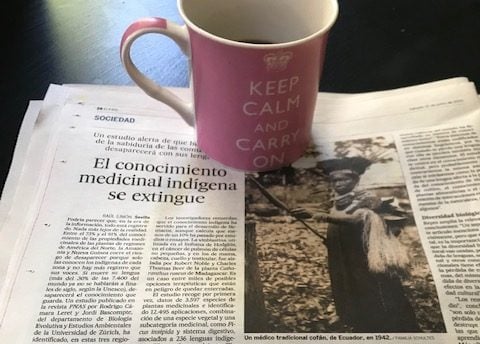
15 June 2021
Weekend thoughts on the plight of the left behind
By Cécile Clerc, MRG’s Director of Development & Partnerships One of my little pleasures every weekend is to be the first to grab…
-

6 February 2021
Why Iraq must support new bill which redresses the suffering of Yezidi women
Today, Yezidis will finally be able to give their loved ones a proper burial in Kocho, a small village in Sinjar, Iraq, after its…
Reports and briefings
View all-
28 June 2023
Understanding barriers to health care for minorities and indigenous peoples in Egypt, Iraq and Tunisia
Minorities and indigenous peoples are among the most marginalized in terms of access to social and economic rights, and this is especially…
-
22 January 2020
Mosul after the Battle: Reparations for civilian harm and the future of Ninewa
Mosul, a metropolis of 1.5 million people, served as the capital of the self-proclaimed caliphate of the Islamic State of Iraq and al-Sham…
-
13 December 2018
Civilian Activists Under Threat in Iraq
The outbreak of large-scale popular protests in Basra and other Iraqi cities from July 2018 has led to a wave of violent repression of…
Films
Guides and toolkits
-
20 May 2022
The Hate Speech Crisis: Ways to start fixing it – A toolkit for civil society organizations and activists
The world is seeing an explosion of hate speech. One analysis records a 400-fold increase in the use of hate terms online in Pakistan…
Events
-
Video on demand
30 September 2021 • 1:00 – 3:00 pm BST
#Incite! Identifying and challenging online hate speech
Around the world hate speech, especially online hate speech, is on the rise. But it’s most dangerous in places riven by political…
-
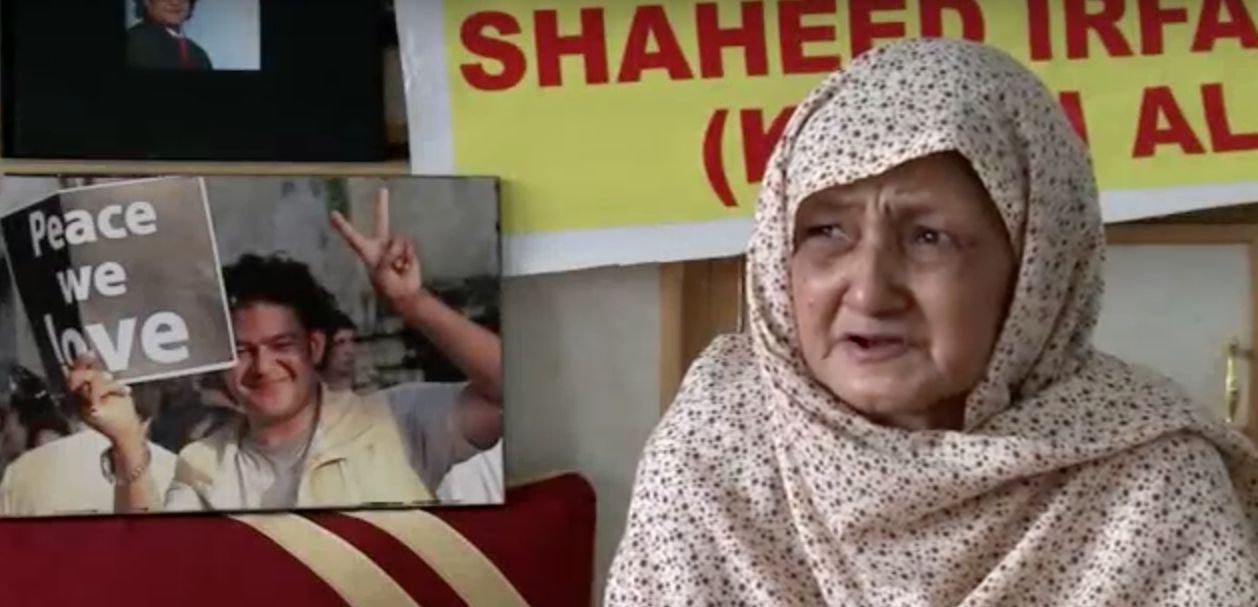 Video on demand
Video on demand 16 December 2015 • 6:00 – 8:00 pm CET
Premiere screening of ‘Noun’ and ‘Shaheedo Tum Kahan Ho’
NOUN (Iraqi-Swiss documentary, 25 minutes, with English subtitles) Director: Aida Schlaepfer Producer: Minority Rights Group International…
-
20 June 2016 • 4:00 – 6:00 pm CEST
Iraq’s Displacement Crisis – Addressing the violations of today and the challenges of tomorrow
Two years after the major offensive of ISIS in the North of Iraq and the fall of Mosul, the number of internally displaced persons (IDPs)…
Don’t miss out
- Updates to this country profile
- New publications and resources
Receive updates about this country or territory
-
Our strategy
We work with ethnic, religious and linguistic minorities, and indigenous peoples to secure their rights and promote understanding between communities.
-
-
